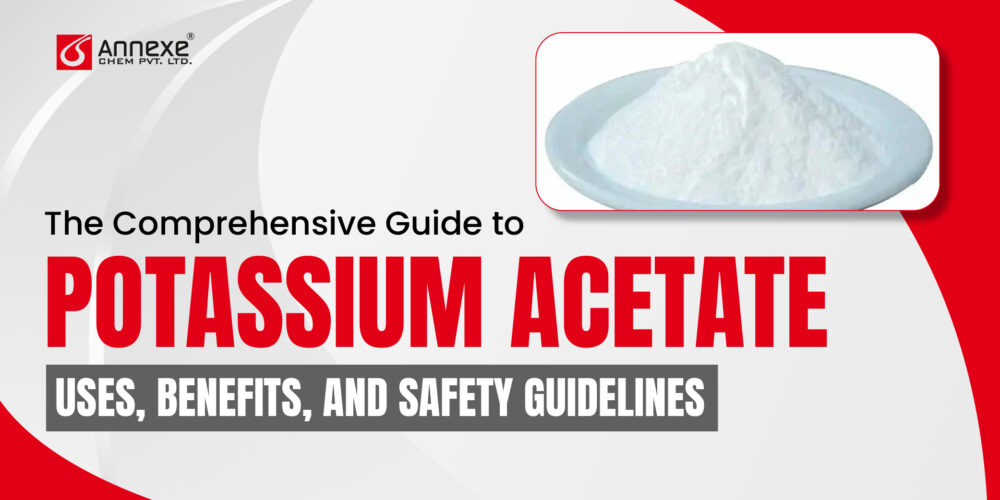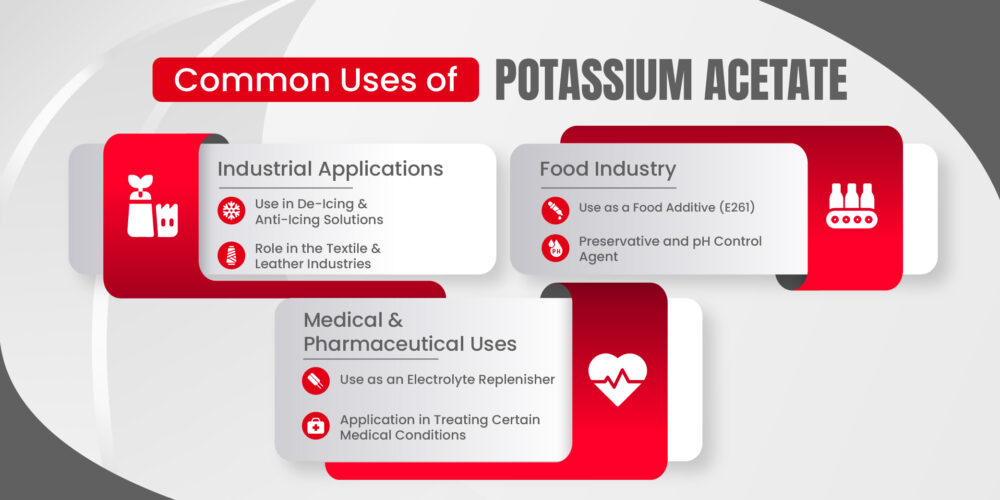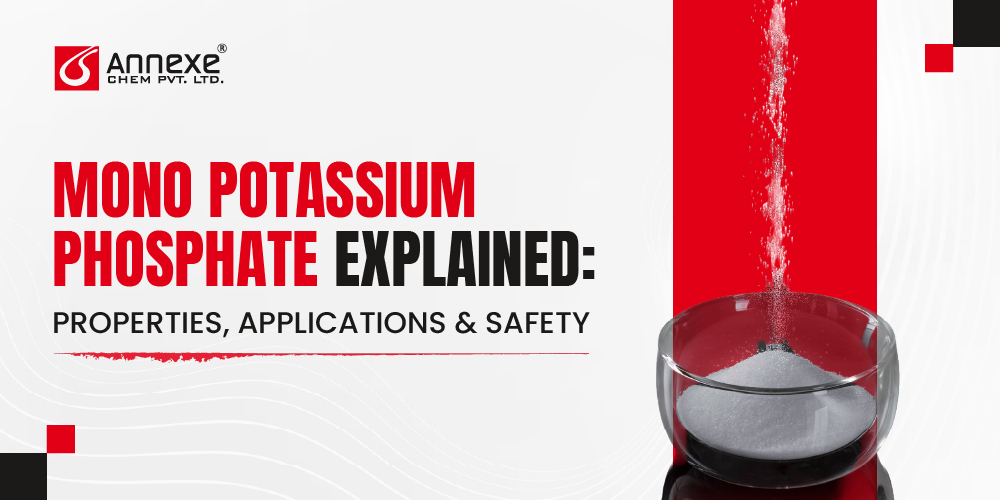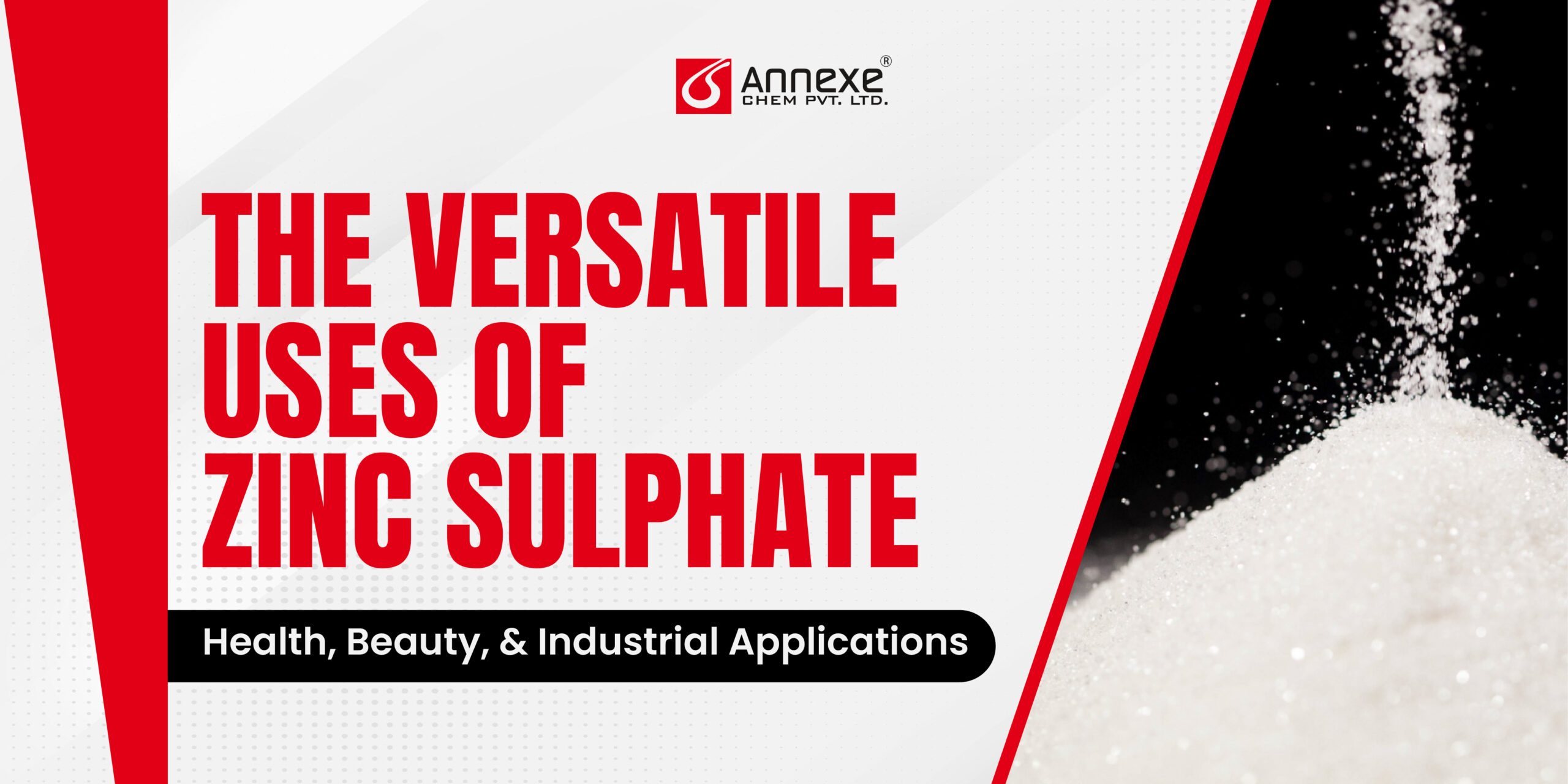The Comprehensive Guide to Potassium Acetate: Uses, Benefits, and Safety Guidelines - Annexe Chem Pvt Ltd
The Comprehensive Guide to Potassium Acetate: Uses, Benefits, and Safety Guidelines

- August 13, 2024
- By Akshita Patel
When you think of potassium, you might picture bananas or sports drinks, but this versatile element does much more. Potassium Acetate, a compound you may not be familiar with, quietly powers a range of industries and even plays a crucial role in healthcare. Whether keeping our roads safe during icy winters or helping maintain our body’s electrolyte balance, Potassium Acetate is a hidden hero with diverse applications. In this blog, we’ll uncover the many faces of Potassium Acetate, exploring its uses, benefits, and the safety considerations that come with it.
Get ready to discover how this unassuming compound impacts our daily lives in ways you never imagined.
What is Potassium Acetate?
Potassium Acetate, chemically represented as CH₃COOK, is a salt formed by the combination of potassium and acetic acid. It appears as a white, crystalline powder, highly soluble in water. This compound is known for its ability to act as a buffering agent, making it useful in various industrial and medical applications. Its chemical structure consists of an acetate ion (CH₃COO-) and a potassium ion (K+), which together give it unique properties that distinguish it from other salts.
Historical Background and Discovery
The use of potassium compounds dates back to ancient times, with early applications in soap-making and glass production. Potassium Acetate itself has been utilized for centuries, particularly in medicine and industry. Its discovery is tied to the broader exploration of potassium salts in the 18th century when scientists first began isolating and studying the properties of various chemical compounds. Over time, Potassium Acetate gained recognition for its versatility and effectiveness in a wide range of applications, from food preservation to medical treatments.

Potassium Acetate is a versatile compound with a wide range of applications across different industries. Its unique properties make it valuable in industrial processes, healthcare, and even food production. Here’s a closer look at how Potassium Acetate is commonly used:
Common Uses of Potassium Acetate
Industrial Applications
- Use in De-Icing and Anti-Icing Solutions: One of the most prominent industrial uses of Potassium Acetate is in de-icing and anti-icing solutions, particularly for airport runways and highways. Unlike traditional rock salt, Potassium Acetate is less corrosive and environmentally friendly, making it an ideal choice for sensitive areas where both safety and environmental impact are concerns. Its effectiveness at lower temperatures allows it to prevent ice formation and facilitate the easy removal of existing ice, ensuring safe travel conditions during winter months.
- Role in the Textile and Leather Industries: In the textile and leather industries, Potassium Acetate is used as a buffering agent and in dyeing processes. Its ability to maintain pH levels is crucial in textile manufacturing, where precision in the dyeing process affects the final quality of fabrics. Similarly, in the leather industry, it helps in the tanning process, contributing to the durability and quality of leather products. Potassium Acetate’s role in these industries underscores its importance in achieving high-quality results in both fabric and leather production.
Medical and Pharmaceutical Uses
- Use as an Electrolyte Replenisher: In the medical field, Potassium Acetate is utilized as an electrolyte replenisher, particularly for patients who suffer from low potassium levels, known as hypokalemia. It is administered to restore the body’s potassium levels, which are vital for maintaining proper muscle function, nerve signaling, and overall cellular function. Potassium Acetate’s effectiveness as an electrolyte replenisher makes it an important component in intravenous fluids and oral rehydration solutions.
- Application in Treating Certain Medical Conditions (e.g., Hypokalemia): Beyond its use as an electrolyte replenisher, Potassium Acetate is also employed in the treatment of specific medical conditions, such as metabolic acidosis, and as a part of dialysis treatment for kidney disease. Its ability to adjust the body’s acid-base balance makes it valuable in managing conditions where pH levels need to be carefully controlled. This application highlights the critical role Potassium Acetate plays in patient care, particularly in clinical settings.
Food Industry
- Use as a Food Additive (E261): In the food industry, Potassium Acetate is recognized as a food additive under the code E261. It is commonly used as a preservative, helping to extend the shelf life of various food products by preventing the growth of harmful bacteria and fungi. Additionally, it acts as a buffering agent to maintain the desired pH levels in foods, ensuring product stability and taste consistency. Its application in food products is carefully regulated to ensure safety for consumption.
- Preservative and pH Control Agent: As a preservative, Potassium Acetate is often added to processed foods, sauces, and dressings to enhance their longevity. Its function as a pH control agent is particularly valuable in acidic foods, where it helps to balance the acidity, ensuring that the flavor and texture of the product remain intact. This dual role as a preservative and pH control agent makes Potassium Acetate an indispensable component in food manufacturing, contributing to the safety and quality of everyday food items.
Potassium Acetate’s wide-ranging uses in industrial, medical, and food applications demonstrate its versatility and importance in modern life. Whether it’s improving safety on icy roads, enhancing the quality of textiles and leather, supporting medical treatments, or preserving the foods we eat, Potassium Acetate plays a significant role in various facets of our daily lives.
Benefits of Potassium Acetate
Potassium Acetate’s benefits extend across various domains, highlighting its importance as a compound that not only supports human health but also offers environmental and industrial advantages. Its role as a key electrolyte, its contributions to cardiovascular health, and its eco-friendly properties make it a compound with significant value in both everyday and specialized applications.
- Electrolyte Importance: Potassium Acetate is essential for maintaining the body’s electrolyte balance, supporting nerve function, muscle contraction, and fluid balance. It’s particularly important in treating potassium deficiency (hypokalemia), helping to ensure the proper functioning of muscles, nerves, and the heart.
- Cardiovascular Health: Adequate potassium levels, supported by Potassium Acetate, are linked to improved cardiovascular health. It helps regulate blood pressure by counteracting sodium’s effects, promoting better blood flow, and reducing the risk of hypertension and stroke.
- Environmental Benefits: As a de-icing agent, Potassium Acetate is environmentally friendly, being less corrosive and biodegradable compared to traditional de-icing salts. Its use reduces environmental damage, protecting water sources and ecosystems.
- Industrial Efficiency: In industrial applications, Potassium Acetate is favored for its stable pH control and non-corrosive nature, making it ideal for textile dyeing, leather tanning, and other processes. Its efficiency as a de-icing agent also means less product is needed, reducing costs and environmental impact.
How to Choose and Use Potassium Acetate Safely
- For Industrial Use: Select Potassium Acetate from reputable suppliers that meet industry standards. Ensure proper storage and handling to maintain safety and effectiveness.
- For Medical Use: Consult healthcare professionals before use to ensure the correct dosage and application, especially for treating conditions like hypokalemia.
- In the Food Industry: Use Potassium Acetate within regulated limits as a preservative and pH control agent. Adhere to food safety guidelines to ensure consumer health.
For premium-quality Potassium Acetate, Annexe Chem Private Limited stands out as a leading Potassium Acetate manufacturer in India. We offer a comprehensive range of fine chemicals, including Potassium Acetate, available in various grades such as LR, AR, ACS, IP, BP, USP, EP, JP, and food grade, tailored to meet specific customer requirements. Our commitment to excellence is reflected in our use of state-of-the-art FDA-GMP facilities, ensuring that our products are of the highest quality. As the best Potassium Acetate distributor in Vadodara, we take meticulous care in packaging our products with advanced technology to preserve their integrity. With our efficient distribution network, we guarantee competitive pricing and timely delivery, ensuring you receive top-quality Potassium Acetate when you need it.
Potassium Acetate is a remarkable compound with a broad range of applications that extend from industrial processes to medical treatments and food safety. Its versatility and benefits, including its role in maintaining electrolyte balance, supporting cardiovascular health, and offering environmentally friendly de-icing solutions, highlight its importance in various fields. Whether used in manufacturing, healthcare, or food production, understanding the proper selection, handling, and application of Potassium Acetate is essential for maximizing its effectiveness and ensuring safety.
By choosing high-quality Potassium Acetate from reputable sources like Annexe Chem Pvt. Ltd, you can benefit from superior products that meet your needs with reliability and efficiency.

Akshita Patel
As an advocate for sustainability, Akshita is committed to driving positive change within the chemical industry. She actively seeks out environmentally friendly solutions and promotes the adoption of sustainable practices. Akshita believes that a balance between economic growth and ecological responsibility is crucial for the industry's long-term success. She is dedicated to finding innovative ways to minimize environmental impact while maximizing efficiency and profitability.
Related Blogs

- March 15, 2025
- By Akshita Patel
Mono Potassium Phosphate Explained: Properties, Applications.
What if a single compound could revolutionize plant growth, enhance food preservation, and even improve industrial.

- October 30, 2024
- By Akshita Patel
The Versatile Uses of Zinc Sulphate:.
From the food you eat to the products you use daily, zinc plays an unsung yet.



